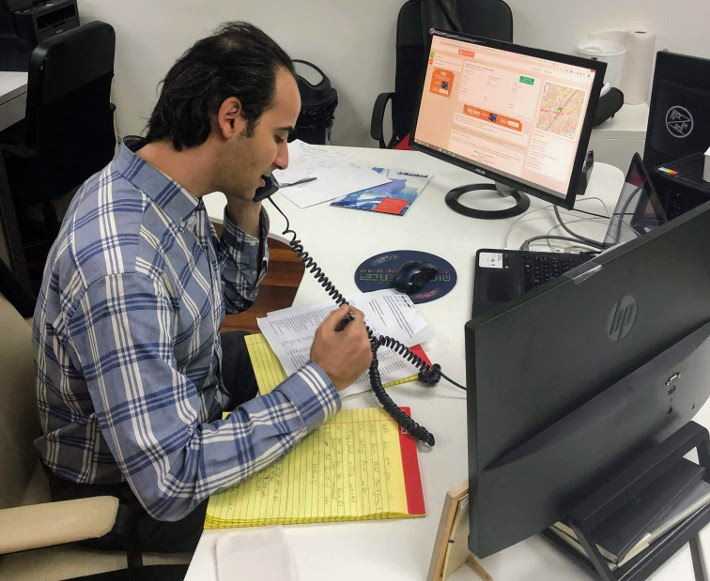True Story: I Cold Called a Merchant
February 25, 2019 While visiting the office of Excel Capital in Manhattan on a reporting assignment, I saw a few open desks. They weren’t exactly empty, just available. There were phones, headsets, and computers all set up, just waiting for a salesperson to sit down and plug in. I pictured the salespeople I’ve previously profiled, smiling & dialing, as they say, contacting small businesses and delivering their best pitch. And for a moment, I imagined it was myself in one of those chairs. A funny thought perhaps if you’ve gotten to know me, but it’s not an uncommon curiosity for a reporter to try and channel a source’s mindset.
While visiting the office of Excel Capital in Manhattan on a reporting assignment, I saw a few open desks. They weren’t exactly empty, just available. There were phones, headsets, and computers all set up, just waiting for a salesperson to sit down and plug in. I pictured the salespeople I’ve previously profiled, smiling & dialing, as they say, contacting small businesses and delivering their best pitch. And for a moment, I imagined it was myself in one of those chairs. A funny thought perhaps if you’ve gotten to know me, but it’s not an uncommon curiosity for a reporter to try and channel a source’s mindset.
Excel CEO Chad Otar obviously caught that flashing glimmer in my eyes, because the next thing I knew he invited me to sit down and make a call myself, a completely cold one… to a merchant.
My instinct was to just observe, but the journalist in me unconsciously accepted the invitation. Before I knew what I was getting myself into, I was sitting at Chad’s desk in the CEO chair, reviewing sales scripts that were handed to me. I read two of them and realized that they were fairly different in tone. The first said something like “I’m calling from the back office and it appears that you once had an interest in funding. I’m checking to see if you still do.” The other one was far more direct. It explained a special offer to prospective clients and it finished with a question, “What are you seeking capital for?”

Chad recommended the more direct route, the one I liked more as well. I didn’t like the idea of being in a “back office.” It sounds so distant, so non-urgent. And from my understanding, a sales call should sound urgent, without being too aggressive either. I knew I had to strike the right balance. I looked at the bolder script and practiced reading it a few times out loud. The script started with “Hello, my name is [John Doe.]” But I thought, “I think ‘hello’ is too formal. ‘Hi’ works better for me.” And I also thought that using just my first name might be more familiar and less intimidating than my full name. So I decided to just use my first name. Note that when introducing myself on the phone at deBanked, I always use my full name because I aim to be very intimidating. I’m totally kidding!
Back to my first EVER cold call. After rehearsing the script a few times and letting everyone around me know that this was my first cold call and a really big deal for me, I picked up the phone and I started to dial. “Hello, this is Kathy” a voice beamed from the other end of the phone. I said “Hi Kathy” and I started to read the script. Then I stopped. For a moment, it was just silent. She didn’t hang up! YES! She also didn’t curse at me or ask that I not call her back again. She didn’t even politely excuse herself. Instead, she asked a few clarifying questions.
“Where are you calling from?”
I could answer that! Except that I made a slight mistake. I called the company Excel Credit, instead of the correct Excel Capital. A subtle enough error, I thought, so I chose not to acknowledge it. And since I’ve been writing about companies like Excel Capital for a little while now, I felt comfortable enough to provide a brief sentence to this woman about what Excel Capital does. “We offer funding to small businesses throughout the US,” I said. I thought this would be a good opportunity to correct my earlier error, so I slipped in “we’re also known as Excel Capital.” That could have sounded shady. But I don’t think she heard it that way.
“How did you find us?” she asked.
“Wow,” I thought. “This is turning into a real conversation!” I didn’t know how her info had been obtained, so I just said “I get lists from my boss and I don’t know exactly how this list was obtained.”
Chad said something to me about previous funding, so I then added: “We got this list of businesses that have previously been funded.”
At this point, I thought to myself “Why don’t you ask a question now?” So I went down to the next question on the script sheet and I asked in a “just happen to be curious” way: “Is there a certain amount that you need?”
“That would be the owner who would know about that,” Kathy said.
Uh-oh. I wasn’t even on the phone with the owner. I wasn’t speaking to the decision maker. But for my first cold call ever, I felt pretty good about it. I gave Kathy Excel’s number and yes, my full name, and I feel like I helped warm up this potential client. They could call back and say that they (Me!) spoke with Kathy. My first cold call wasn’t so bad, and honestly, I’m kind of ready to make 200 more! Just kidding.
Elevate Reflects on Success of Fintech in Personal Loans
February 21, 2019The unsecured personal loan market hit an all-time high in 2018, jumping 17 percent year-over-year to $138 billion, according to data from TransUnion released today and featured in a CNBC story.
“The rapid growth in consumer loans sits squarely on the shoulders of fintechs,” said Jason Laky, senior vice president and leader of TransUnion’s consumer lending line of business. “They continue to be the main driver.”
According to the data, fintech companies, like LendingClub, Prosper and Elevate, issued 38 percent of all U.S. personal loans last year, which is up from 35 percent in 2017 and just five percent in 2013. Conversely, banks’ market share for unsecured personal loans is shrinking. Traditional banks’ share of these loans is down to 28 percent from 40 percent five years ago.
Will this trend continue? The non-bank consumer lenders think so.
Credit unions are down to 21 percent from 31 percent in the time period. While their market share shrank, they still saw overall growth in total loan balances, according to Laky.
“Although regulations are starting to loosen, banks still cannot provide the kind of emergency funds that so many Americans need,” Chief Operating Officer of Elevate Credit Jason Harvison told deBanked via email.
He said that the rise of the gig economy has created near-constant income volatility for a large number of Americans and cited a recent JP Morgan Chase study that found that 41% of U.S. households experience income fluctuations of 30% or more month-to-month.
“Many consumers who need access to funds quickly in order to weather financial emergencies can’t access personal loans from banks,” Harvison said. “Online lenders can help fill this void.”
By lending to non-prime borrowers, do these lenders worry a lot about what might happen in an economic downturn?
“We’ve found in past downturns that non-prime consumers actually fare better than prime,” Harvison said. “Essentially, non-prime consumers are always living their lives in a state of “recession.” They experience income volatility, job insecurity, and a lack of access to necessary financial products. They live like this every day, and therefore know how to weather these challenges.”
How Should a Funder Market?
February 20, 2019 Whether it’s marketing to ISOs or for direct leads, funders have different marketing techniques that suit their size and business philosophy.
Whether it’s marketing to ISOs or for direct leads, funders have different marketing techniques that suit their size and business philosophy.
Credibly, a New York-based company of 160 employees, works with LendingTree and uses Google and Facebook for leads. But Director of Marketing and Strategic Partnerships Jeffrey Bumbales said that advertising on large pay-per-click channels may not be the right move every funder.
“If you’re unsure as to whether [Google or Facebook] are worth pursuing, lead generators are a great benchmark. If your average cost per lead is more expensive than the market price, you’re better off allocating your spend towards the lead generators and other channels.”
Credibly has used LinkedIn for marketing, but Bumbales acknowledged that the platform can be very expensive. They have used Sponsored InMail, which sends direct messages to targeted business owners. Bumbales said this can be very effective, but it requires you to have at least one person managing the responses, which can be very time intensive.
Bumbales also emphasized the importance of diversifying lead sources such that you never have more than one-third of your marketing spend devoted to one source.
Heather Francis, CEO of Elevate Funding, never devotes more than one-third of her marketing in any one area. That’s because she doesn’t really do any marketing. Yup. Elevate, a funder of about 20 employees in Gainesville, FL, gets by just fine without marketing.
“It’s all word of mouth and networking,” Francis said.
Francis says she loves it when an ISO will say “I keep seeing your [company] name on merchant bank statements,” meaning that when files get circulated, the ISO keeps seeing that merchants are being debited by Elevate.
Francis has taken the approach of letting others approach her company. Kind of like dating.
“We want to work with people who want to work with us,” Francis said. “And in this business, everything is reputational based.”
If there’s anyone who knows anything about marketing, it’s Jennie Villano, Vice President Of Business Development at Kalamata Capital Group.
Villano uses LinkedIn to market to ISOs, posting friendly videos of herself speaking directly to the ISO community on an almost daily basis.
Last year, Villano started a cooking show video series on her LinkedIn page called “Cooking with Kalamata,” in reference to her company’s name. In each video, she invites a different guest to cook something with her in an informal home kitchen setting.
“Cooking has nothing to do with lending, but it doesn’t matter,” Villano told the audience on a marketing panel at last year’s Broker Fair.
The cooking shows allow potential clients to see her in a casual, non-business environment so that even if she hasn’t met many of her LinkedIn contacts, they feel like she’s a personal friend.
“And people want to do business with their friends,” she said.
Small Community Banks Power Fintech Revolution
February 15, 2019 “A few years back there was a lot of disruption talk about how the fintechs were going to destroy the banks,” said Jo Ann Barefoot, co-founder of Hummingbird Regtech and a former deputy U.S. Comptroller of the Currency, which regulates national banks. “There’s much more talk in the last few years about the need for banks to partner [with fintechs].”
“A few years back there was a lot of disruption talk about how the fintechs were going to destroy the banks,” said Jo Ann Barefoot, co-founder of Hummingbird Regtech and a former deputy U.S. Comptroller of the Currency, which regulates national banks. “There’s much more talk in the last few years about the need for banks to partner [with fintechs].”
This quote was cited in a CNBC story published today and judging from the recent bank partnerships with some of the largest fintech companies – including Square, Stripe and Robinhood – this could not be more evident. The CNBC story points out that most of these fintech/bank partnerships are not with household name banks, but rather with small community banks that welcome the business. These banks, including Sutton Bank, headquartered in Attica, OH, Cross River Bank, headquartered in Fort Lee, NJ, and Celtic Bank, headquartered in Salt Lake City, UT, are handling the banking activities for these growing fintechs – activities like holding customer deposits and underwriting consumer and business loans. And significantly, making sure that everything is up to snuff with government regulations.
A number of fintechs, including Square and SoFi, have tried to take the banking component of their businesses into their own hands by applying to become an ILC bank. But they have been met with tough resistance, much of it coming from, interestingly, community banks.
“No one envisioned when they wrote the ILC charter that we would have fintech companies that finance mortgages and student loans from private equity capital and not deposits,” President and CEO of the Consumer Bankers Association told deBanked last year. “It’s a new world. Like with all rules and regulations, federal regulators should periodically review longstanding policy.”
So far, the opposition has been relatively successful but time will tell if it keeps up. Square and SoFi withdrew their ILC loan their applications, but Square eventually reapplied. At the 2018 Money 2020 conference in Las Vegas, SoFi CEO Anthony Noto said he would entertain seeking ILC bank status.
Small Business Funders Court Florists Before Valentine’s Day
February 14, 2019 Earlier this month, LendingTree published results from a survey they conducted about consumer spending on Valentine’s Day.
Earlier this month, LendingTree published results from a survey they conducted about consumer spending on Valentine’s Day.
The main takeaway is that men are planning to spend almost two and a half times more than what their significant others (of either gender) expect them to spend. So there might be some nice surprises today! On average, according to this survey, men plan to spend $95 today for their significant others, while women plan to spend $41. Also according to this survey, those who are engaged plan to spend $92 on their significant other, people in the dating stage of relationships plan to spend $88, and married people plan on spending $57. (The average for men is increased by spending based on generation.)
Regardless, Director of Personal Loans at LendingTree, Michael Funderburk, said that these amorous expenses are typically not large enough to show any spike in consumer borrowing. Small business borrowing, however, is a different story. As might be expected, there is a noticeable spike in borrowing from florists, among other small businesses that cater to the holiday.
Chad Otar, CEO of New York-based Excel Capital, a small business funder, said that they always fund more florists, chocolate shops and gift shops leading up to Valentine’s Day because these merchants need additional money to buy more inventory. Excel’s team of a little under 20 includes an in-house sales team that Otar said markets to these kinds of businesses in the weeks before Valentine’s Day.
The larger Reliant Funding, which has a sales team of about 100 people, makes an active marketing push before Valentine’s Day to reach more than 13,000 U.S. florists in its database, according to its Chief Marketing Officer Steve Kietz.
“Our business with these firms increases before Valentine’s Day and Mother’s Day,” Kietz said. “We see lots of repeat business from those firms as they stock up for peak season. [And] we increase our mail and digital marketing activities to sync with when florists will be most responsive.”
Houston-based Accord Funding, doesn’t have an in-house sales team. Still, its CEO, Adam Beebe, said that while they don’t track submissions by merchant category, they do underwrite florists with seasonality in mind.
Fintech Inevitable, But Petrou Says Risks Abound
February 12, 2019 At the end of last week, two large regional banks, BB&T and SunTrust announced that they are merging. The entity will be the sixth largest U.S. bank and the largest bank merger since the 2008 financial crisis. A MarketWatch story yesterday indicated that large bank mergers are part of a somewhat recent trend, citing the mergers of Chemical Bank with TCF Bank, and Key Bank with First Niagara, both in 2016. (The number of bank acquisitions have been static in 2017 and 2018, with 252 and 253 banks, respectively, according to American Banker.)
At the end of last week, two large regional banks, BB&T and SunTrust announced that they are merging. The entity will be the sixth largest U.S. bank and the largest bank merger since the 2008 financial crisis. A MarketWatch story yesterday indicated that large bank mergers are part of a somewhat recent trend, citing the mergers of Chemical Bank with TCF Bank, and Key Bank with First Niagara, both in 2016. (The number of bank acquisitions have been static in 2017 and 2018, with 252 and 253 banks, respectively, according to American Banker.)
If large bank mergers are a trend, Managing Director of Federal Financial Analytics Karen Petrou told MarketWatch that this is in part because banks realize that they can combine resources to develop mobile banking capabilities to compete with online banks.
“If banks don’t come up with ways to innovate, they die,” Petrou told MarketWatch yesterday. “Then consumers are left to do their banking with nonbanks.”
Federal Financial Analytics, where Petrou is the managing director, is a Washington, D.C.-based consulting firm and Petrou is a highly regarded voice in the financial regulation space.
While Petrou acknowledges that online banking is the only alternative if traditional banks don’t innovate, she sees serious problems in fintech which she outlined in a paper published earlier this month, according to American Banker.
For instance, she wrote about the danger of a company like Amazon getting into banking and being able to charge individuals different amounts for the same item based on its knowledge of how much money the customer has. Or, the implementation of better banking policies for people who exercise and eat healthier. Petrou says this favors wealthier people with more time for exercise and greater access to more expensive, healthier food.
“I am all for technology,” Petrou said. “But I spent a lot of time when I was a student at MIT studying tech policy, and there is one after another example of seemingly promising technologies with terrible, unintended consequences.”
Liquid FSI to Augment Healthcare Lending Platform with Blockchain Technology
February 11, 2019Liquid FSI announced today that it has entered into an agreement with TVS Next, an IT company, to build a blockchain platform to enhance its healthcare lending capabilities.
“Our Blockchain solution solves a myriad of issues including the privacy of provider [typically medical office], biller, payer, patient and bank data,” said Liquid FSI President and CEO, Frank Capozza. “Blockchain will also support our on-demand payment offering Convert2Pay…and we believe that TVS Next has the depth of resources we need to serve the $3.6 trillion healthcare market.”
The is an improvement of Liquid FSI’s Convert2Pay offering which can provide cash in as little as 24 hours to medical offices with insurance claims.
“Instead of waiting 45 days or 60 days to get paid, [the doctor] can get paid in 24 hours because we’ve done all the analytics, and we’re scored [the medical practice] on a scale from 1 to 10,” Capozza said. “If he’s a solid performer and he’s using our platform to level out his peaks and valleys in cash flow, we see all of that in the system.”
The new use of blockchain, a decentralized system that logs information anonymously into a ledger, should give increased confidence to Liquid FSI’s medical office clients, Capozza said.
Capozza said he has excellent relationships with a number of brokers who send him clients. But as evidence of the privacy problem, he said that he will occasionally get applications from some brokers that include patient names, addresses, and social security numbers. This information isn’t stolen, but can be released by a medical practice if it needs money urgently. Capozza said he would rather see less of this and is confident that the new blockchain technology will significantly reduce any privacy lapses.
“It’s the same product, but it’s improving the privacy for everyone involved,” he said.
He also said that they are in talks with three banks that will be able fund on the Convert2Pay platform and will be comforted by the increased privacy afforded by the blockchain technology to be used by Liquid FSI. Capozza said Liquid FSI has plans to offer credit to doctors and sees itself as a VISA for the healthcare industry.
Aside from working with broker partners, Liquid FSI also works with medical billing companies to obtain clients, like pediatrician or dentist offices. Founded in 2014, the company has made some key recruitments to its overall team over the past year, including the addition of Barry Blecherman, professor of Finance and Risk Engineering at the NYU Tandon School, to its Board of Advisors.
Why the Human Connection is Still Important in Debt Recovery
February 10, 2019 The CEOs and lawyers for debt recovery companies, particularly those in the commercial space, say that speaking to merchants over the phone is the best way to collect money for their clients. At New York-based Empire Recovery, Managing Attorney Steven Zakharyayev told deBanked that they call this “soft collection.”
The CEOs and lawyers for debt recovery companies, particularly those in the commercial space, say that speaking to merchants over the phone is the best way to collect money for their clients. At New York-based Empire Recovery, Managing Attorney Steven Zakharyayev told deBanked that they call this “soft collection.”
“Soft collection is probably the most effective way of collecting,” Zakharyayev said. “You can tie up [the merchant’s] business and freeze their accounts. That’ll bring them to the table. But the human interaction – negotiating with them – that’s where the deals are made and that’s how these accounts are ultimately repaid.”
Most of of the debt collection companies we spoke to have an in-house lawyer that can file a lawsuit against the merchant while also using “soft collection” to get to a settlement. But Dedicated Commercial Recovery, a Minnesota-based recovery firm led by Shawn Smith, who is not an attorney, sees itself as the step before attorneys get involved.
“We use a rapport-based collections approach,” Smith said. “We try to get to the real reasons why the customers are ignoring our client and come up with a viable solution for repayment.”
Merchants in default are usually not doing very well if they’re on a collections list.
“These [merchants] get pretty beat up by the time they get to us, so the more you can connect with [them] on a personal level, the better.”
Doug Robinson, the attorney at New York-based RTR Recovery, echoed this.
“There’s a story behind every default,” Robinson said. “Most of the merchants want to pay, so they appreciate someone reaching out and saying ‘What’s the matter?’”
Robinson said that he personally calls and emails every merchant and that they have a pretty high response rate with this simple technique. He said that the voicemails of the merchants are often full, but that they will usually respond to his email, where he explains that ignoring him will only escalate the problem.
If the merchant responds and engages with him, Robinson said he can create a payment plan with them, together with his client, that can reduce the merchant’s payments, stop payments temporarily, or change payments from daily to weekly.
Meanwhile, Houston, Texas-based AMA Recovery is often brought on after a collections agency has already unsuccessfully tried to get a merchant to pay. AMA Recovery’s Vice President of Legal Operations Kimberly Raphaeli said that a demand letter is always sent to the merchant, in addition to the use of secret shoppers or contacting neighboring stores to determine if a store is really out of business if the merchant says it is.
Even with these more aggressive tactics, Raphaeli said that calling is still critical. She said that they will move files around the office, noting that merchants respond differently to different personality types. Raphaeli said that by the time a file gets to AMA Recovery, the majority of the merchants have simply decided to stop paying and about 30% are legitimately no longer in business.
Having a merchant go out of business is never a good outcome for a collector.
“You want to keep them in business,” Zakharyayev said. “[…] You want to make a relationship with them where you leave them enough to stay in business but you collect enough that your client is satisfied and they get paid in full.”
While these collection companies all agreed that communicating – one human being to another – is the best way to approach recovery, that doesn’t mean that technology is thrown out the window. None of the companies deBanked spoke to said they use autodialing, but Smith said he uses texting and email technology to make contacting merchants more efficient.
Mark LeFevre, CEO of Kearns, Brinen & Monaghan, a collections firm with offices in Delaware and South Carolina, agreed that technology makes the collections process more efficient.
“It’s important that you combine technology with the [human touch] to be most effective,” LeFevre said. “The technology will allow us to get the client to show what we can do, how we do it and so forth. But once that relationship is gained…we must talk with their customers.”






























